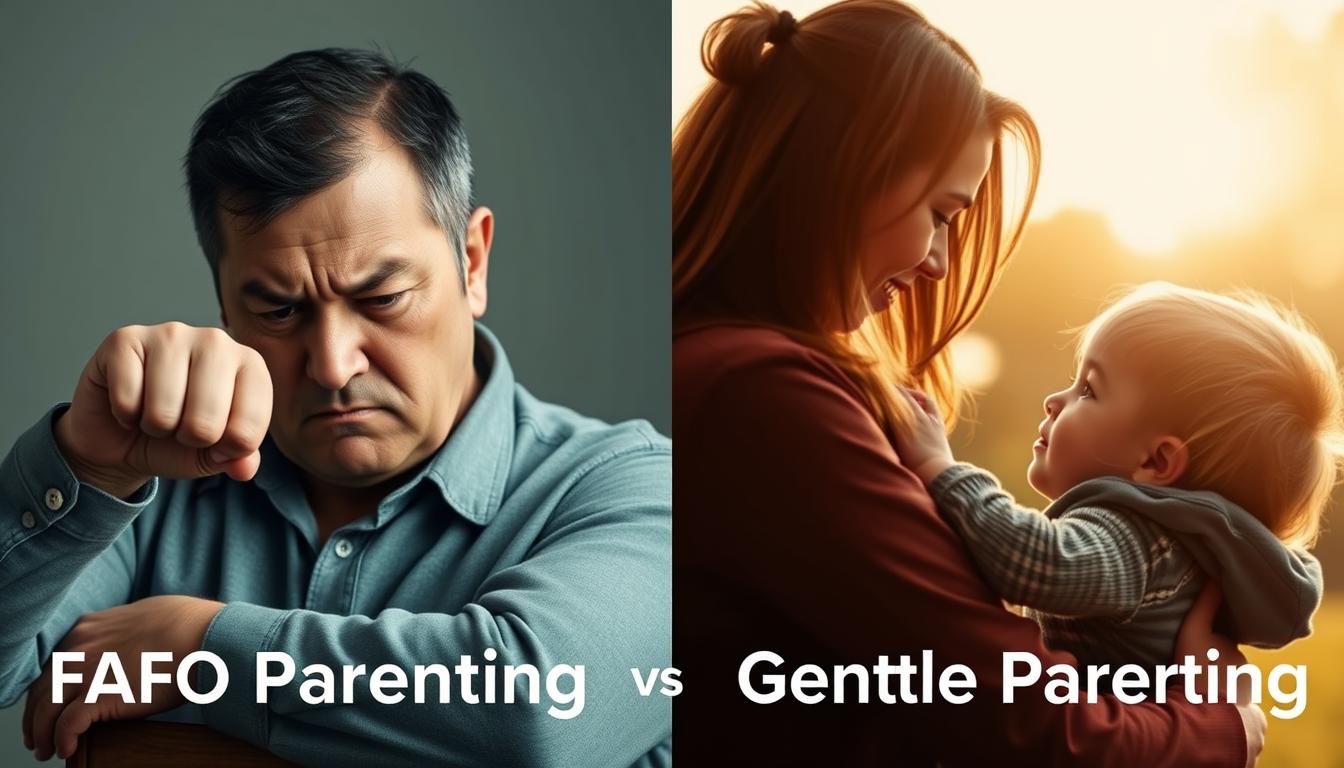FAFO Parenting vs. Gentle Parenting: What’s the Real Difference?
As a parent, have you ever wondered if you’re striking the right balance between discipline and compassion when raising your kids? The debate between FAFO parenting and gentle parenting has been gaining attention, leaving many parents questioning their approach.
FAFO parenting is about letting children experience the natural consequences of their actions, while gentle parenting focuses on empathy and connection. But what’s the real difference between these two philosophies, and how can understanding them help you make informed decisions about your parenting style?
In this article, I’ll explore the contrasting approaches of FAFO and gentle parenting, and help you determine which one might be the best fit for your family.
Key Takeaways
- Understand the core principles of FAFO and gentle parenting
- Learn how each approach impacts child development
- Discover the benefits and drawbacks of each philosophy
- Gain insights into how to balance discipline and compassion
- Make informed decisions about your parenting style
Understanding Modern Parenting Trends
The way we parent has changed dramatically over time, reflecting shifts in cultural values, research findings, and generational perspectives. As a result, modern parenting trends have evolved to incorporate new ideas and approaches.

The Evolution of Parenting Philosophies
Parenting philosophies have undergone significant transformations. Traditionally, parenting was often authoritarian, with parents relying on strict rules and punishments. However, as our understanding of child development has grown, so too has the recognition of the importance of more nuanced and empathetic approaches. Research in child psychology has shown that natural consequences can help children build executive functioning skills and self-regulation.
- Cultural shifts have influenced parenting styles, with modern trends reflecting changing societal values.
- Advancements in research have led to a better understanding of child development and more effective parenting strategies.
- Generational changes have also played a role, with younger parents seeking alternative approaches to those used by their parents.
Why Parenting Styles Matter
Choosing the right parenting style is crucial for child development, family dynamics, and long-term outcomes. Different parenting approaches can significantly impact a child’s emotional regulation, independence, and decision-making abilities. By understanding the various parenting trends and their underlying philosophies, parents can make informed decisions about their approach to parenting.
In the ever-changing world of parenting, staying informed about the latest trends and research is essential. By doing so, parents can provide their children with the best possible start in life.
What Is FAFO Parenting?
FAFO parenting is a modern approach to raising children that focuses on letting them experience the natural consequences of their actions. This parenting philosophy is centered around the idea that children learn valuable lessons when they are allowed to face the outcomes of their choices without constant parental intervention.
The Philosophy Behind “F Around and Find Out”
The term “FAFO” has been adopted in parenting as a way to describe the process of allowing children to learn through their experiences. It’s about giving kids the autonomy to make decisions and understand the consequences of those decisions. For instance, if a child refuses to wear a jacket on a cold day, they’ll quickly learn that being cold isn’t pleasant, and they’re likely to wear a jacket next time without a fight.
This approach is not about being neglectful or abandoning parental responsibility; rather, it’s about strategic non-intervention when it’s safe for children to learn from their experiences. By doing so, parents can help their children develop resilience, independence, and an understanding of cause-and-effect relationships.
Key Principles of FAFO Parenting
The key principles of FAFO parenting include:
- Building resilience by letting children face challenges
- Fostering independence by giving children autonomy
- Teaching cause-and-effect relationships through natural consequences
By implementing these principles, parents can reduce power struggles and constant negotiations with their children. FAFO parenting encourages children to take responsibility for their actions and make informed decisions.
Real-Life Examples of FAFO in Action
A great example of FAFO parenting in action is when Kylie Kelce shared how her husband handled their daughter refusing to wear a jacket on a cold day. He took her outside for less than a minute, and upon returning, she realized it was cold and decided to wear her jacket. This simple yet effective approach taught their daughter a valuable lesson about dressing appropriately for the weather.
Other examples include letting a child experience hunger after skipping a meal or dealing with the consequences of not completing their homework. These experiences teach children important life lessons and help them develop into responsible individuals.
What Is Gentle Parenting?
Gentle parenting is an approach that prioritizes empathy, respect, and understanding in parent-child relationships. This method focuses on building strong connections between parents and their kids, rather than relying on punishment or rewards.
As Kylie Kelce aptly put it,
“I think there are some misunderstandings about the idea of gentle parenting. There are people who gentle parent in a way that their kids have no boundaries and are never told no. And I just don’t feel as though my kids would be equipped to enter the world and hear no from other people.”
This quote highlights a common misconception about gentle parenting.
The Core Philosophy
The core philosophy of gentle parenting revolves around creating a nurturing environment where children feel safe to express themselves. It’s about understanding the child’s perspective and emotions while maintaining appropriate boundaries. This approach aims to foster a sense of security and trust, allowing children to develop emotionally and socially.
Gentle parenting emphasizes the importance of emotional regulation, positive reinforcement, and age-appropriate explanations. By doing so, parents can help their children develop self-regulation skills and a positive sense of self.

Key Principles and Techniques
Gentle parenting involves several key principles and techniques, including validation, active listening, and collaborative problem-solving. These methods help parents connect with their children on a deeper level, reducing conflicts and promoting a more harmonious home environment.
Some of the key techniques used in gentle parenting include:
- Emotional validation: acknowledging and accepting a child’s feelings
- Active listening: fully engaging with and understanding a child’s concerns
- Collaborative problem-solving: working together with the child to find solutions
Common Misconceptions
One common misconception about gentle parenting is that it means having no boundaries or never saying “no” to children. However, effective gentle parenting still includes firm boundaries and expectations, just delivered with empathy and respect.
By understanding the principles and techniques of gentle parenting, parents can create a more nurturing and supportive environment for their children to thrive.
FAFO Parenting vs. Gentle Parenting: What’s the Real Difference?
In the realm of modern parenting, two distinct approaches have emerged: FAFO parenting and gentle parenting, each with its unique philosophy and methods. As parents navigate the complex landscape of raising children, understanding the differences between these two approaches becomes increasingly important.
Philosophical Differences
The core philosophy of FAFO parenting revolves around allowing children to experience the natural consequences of their actions, fostering independence and problem-solving skills. In contrast, gentle parenting focuses on empathy, understanding, and building a strong emotional connection with the child. While both approaches aim to raise capable and confident children, they differ significantly in their methodologies.
FAFO parenting emphasizes the importance of children learning from their mistakes, thereby developing resilience and decision-making abilities. Gentle parenting, on the other hand, prioritizes emotional intelligence and validates children’s feelings, creating a nurturing environment.
Approach to Discipline and Consequences
Discipline is a critical aspect of parenting, and both FAFO and gentle parenting approaches handle it differently. FAFO parenting relies on natural consequences to teach children valuable life lessons, whereas gentle parenting uses guidance and discussion to help children understand the impact of their actions.
- FAFO parenting: Allows children to face the consequences of their decisions, promoting self-regulation and responsibility.
- Gentle parenting: Encourages open communication and empathy, helping children understand why certain behaviors are not acceptable.
Parent-Child Relationship Dynamics
The dynamic between parent and child varies significantly between the two approaches. FAFO parenting tends to reduce power struggles by removing the parent as the enforcer of consequences, allowing children to learn from their own experiences. Gentle parenting, by focusing on empathy and understanding, aims to build cooperation and a strong emotional bond between parent and child.
In FAFO parenting, the parent acts more as a guide, stepping back to let natural consequences unfold. In gentle parenting, the parent is more involved in the child’s emotional journey, using validation and discussion to guide behavior.
Long-Term Effects on Child Development
Research suggests that both parenting styles can have profound effects on child development. FAFO parenting can enhance independence and resilience, while gentle parenting can foster emotional intelligence and strong parent-child relationships. The long-term effects of each approach can vary based on the child’s temperament and the parent’s consistency in applying the chosen parenting style.
Ultimately, understanding the differences between FAFO and gentle parenting can help parents make informed decisions about their parenting style, tailored to their child’s unique needs and their own values.
Finding Your Parenting Balance
The key to successful parenting lies not in adhering strictly to one method, but in finding a balance that works for you and your child. Effective parents often blend elements from various parenting styles, taking what resonates with them and discarding what doesn’t. For instance, FAFO parenting can be particularly useful in low-stakes situations where children can safely learn from their choices, such as refusing to wear a jacket in cold weather or forgetting their lunch.
However, when it comes to safety concerns, such as crossing the street without looking or touching a hot stove, gentle parenting techniques may be more appropriate. It’s crucial for parents to assess their own temperament, values, and parenting goals to create a personalized approach. Consistency in core values matters more than perfectly executing any particular parenting style. As children grow and develop different needs, parents should be flexible and adapt their approach accordingly.
Remember, all parents make mistakes, and modeling how to learn from those mistakes is a valuable lesson for children. By understanding different parenting approaches, parents can respond thoughtfully rather than reactively to challenges, ultimately giving them more tools in their parenting toolbox.








